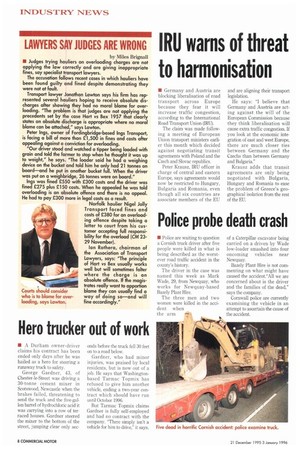LAWYERS SAY JUDGES ARE WRONG
Page 10

If you've noticed an error in this article please click here to report it so we can fix it.
by Miles Brignall • Judges trying hauliers on overloading charges are not applying the law correctly and are giving inappropriate fines, say specialist transport lawyers.
The accusation follows recent cases in which hauliers have been found guilty and fined despite demonstrating they were not at fault.
Transport lawyer Jonathan Lawton says his firm has represented several hauliers hoping to receive absolute discharges after showing they had no moral blame for overloading. "The problem is that judges are not applying the precedents set by the case Hart vs Rex 1957 that clearly states an absolute discharge is appropriate where no moral blame can be attached," says Lawton. Peter Ings, owner of Fordingbridge-based Ings Transport, is facing a bill of more than £1,500 in fines and costs after appealing against a conviction for overloading. "Our driver stood and watched a tipper being loaded with grain and told the farmer to stop when he thought it was up to weight," he says. "The loader said he had a weighing device on the bucket and told him he only had 21 tonnes on board—and he put in another bucket full. When the driver was put on a weighbridge, 26 tonnes were on board." Ings was fined £550 with £300 costs and the driver was fined £275 plus £150 costs. When he appealed he was told overloading is an absolute offence and there is no appeal. He had to pay £300 more in legal costs as a result.
Norfolk haulier Nigel Jolly Transport faced fines and costs of £380 for an overloading offence despite taking a letter to court from his customer accepting full responsibility for the overload (CM 2329 November).
Ian Rothera, chairman of the Association of Transport Lawyers, says: "The principle of Hart vs Rex usually works well but will sometimes falter where the charge is an absolute offence. If the magistrates really want to apportion blame they can usually find a way of doing so—and will fine accordingly."




























































































































